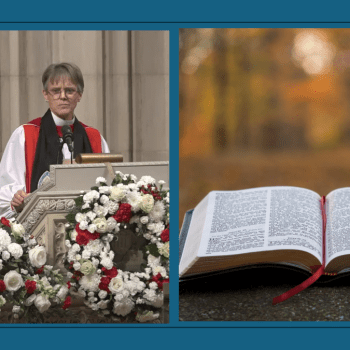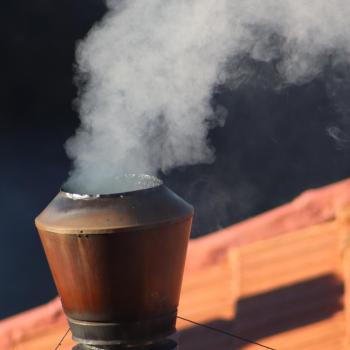By now you've heard all about the musical "The Book of Mormon" and its dominance at this year's Tony Awards. You've watched some of the numbers online. You've read a variety of LDS responses to the phenomenon, taking positions ranging from cool-kid right-on to spluttering rebuttal. Maybe you even know where you lie on that spectrum. I certainly don't.
One thing most LDS reviewers agree on is the fact that Parker and Stone take liberties in their portrayal of Mormon teachings, perhaps intentionally or perhaps merely misunderstanding. Moreover, the theme of the musical—roughly, that most religion is silly, man-made clap-trap, but that it can be tolerated as long as it performs some useful social service—is deeply at odds with Mormon claims about its own revealed origin, its unique role in human history, and its commitment to the authenticity of its modern scripture.
But what if it isn't? What if there's a hidden message in Mormonism right out of the Parker/Stone libretto?
Indulge me for a moment as I pretend to be a literary critic. There's an important element of play in literary criticism, and critics love nothing more than a good pun. (Ninety percent of French cultural theory is punning.) "The Book of Mormon"—the musical—and The Book of Mormon—the book of scripture—is big fat juicy pun: the words are the same, but the meanings are very different.
Except when they're not. The Book of Mormon, in fact, outdoes Parker/Stone at their own game, when it comes to the first part of their message anyway. The Book of Mormon puts the message that most religion is clap-trap into the mouths of more characters even, I venture to say, than "The Book of Mormon" itself; the only thing it's missing is a catchy melody and a Tony award. The idea that human cultures labor in mental thrall to the silly traditions of their fathers is a major theme of The Book of Mormon. Take for instance the character Korihor, who sounds like something from South Park when he says:
Behold, these things which ye call prophecies, which ye say are handed down by holy prophets, behold, they are foolish traditions of your fathers. . . . Ye look forward and say that ye see a remission of your sins. But behold, it is the effect of a frenzied mind; and this derangement of your minds comes because of the traditions of your fathers, which lead you away into a belief of things which are not so. (Alma 30:14, 16)
Korihor is a bad guy, sure, but the same idea is expressed over and over by the good guys, too. The fact that the good guys say it about the bad guys' religion, even as the bad guys say it about the good guys' religion, adds an inherently relativizing subtext to the Book of Mormon: all religion looks like a fraud from the outside, it says, and religious affiliation depends primarily on one's cultural origin. All in all, The Book of Mormon uses the word "tradition" forty-two times, and the vast majority of those are pejorative references to the "foolish traditions of the fathers." The Book of Mormon thus heartily agrees with "The Book of Mormon" that much of human religion is foolish, man-made claptrap.
If you object that the overall message of The Book of Mormon, in contrast to what dozens of its characters say, is that true revealed religion is both legitimate and knowable, then you're exactly right. Furthermore, The Book of Mormon never goes the final step with Parker and Stone, allowing false religion to perform certain kinds of ideological work as long as it's acknowledged to be false. In The Book of Mormon, false religion is deadly serious, to be rooted out at every turn.
Except . . . when it's not. Orson Scott Card offered a very interesting reading of an episode in The Book of Mormon, in which the leader of an ethnic sub-group called the Mulekites claims that his tribe is descended from a lost son of King Zedekiah. According to the story, this lost Israelite prince, Mulek, made his own ocean crossing from the old world to the new; the Mulekites offer up this royal lineage as capital in a struggle for political dominance with a rival tribe, the Nephites. Biblical history offers no corroboration for this extraordinary claim, and Card suggests that it is essentially a self-mythologizing Mulekite fabrication with no basis in history. (Please carefully note that Card is suggesting that the Mulek episode only is fabricated, situated within what he considers to be the authentic sacred history of the Nephites.) But when the Nephites prevail, they allow the Mulek fable to persist because it is socially useful to do so. Card writes:





